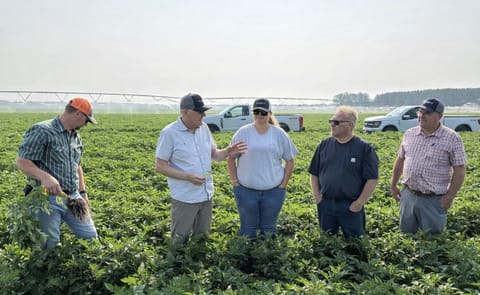Andrew McKenzie-Gopsill is experimenting with using a sandblaster to help manage weeds.
Researchers looking into using sandblasters to kill weeds in potato fields

Scientists are running experiments at a Harrington, P.E.I., field to see if they can better manage weeds by using a sandblaster filled with crushed walnuts, corncobs and baking soda. The research is part of a federal program looking into environmentally friendly ways to kill weeds in high-value crop fields.
Using a commercial sandblaster, corncob and walnut grit are blasted at 100 PSI onto the sides of potato rows. Baking soda is sprayed afterwards to help kill the weeds. Andrew McKenzie-Gopsill is a weed scientist and researcher with Agriculture and Agri-Food Canada.
Andrew McKenzie-Gopsill:
 McKenzie-Gopsill said he's seen about 50 per cent effectiveness in stopping weeds so far. He said there's virtually no damage to the potatoes or the crop yield. But the weed isn't being stopped from the seed, which is something he'd like to see.
McKenzie-Gopsill said he's seen about 50 per cent effectiveness in stopping weeds so far. He said there's virtually no damage to the potatoes or the crop yield. But the weed isn't being stopped from the seed, which is something he'd like to see.
More sustainable
The team took its first run at the weeds two weeks ago, with the final round applied Tuesday. Similar experiments are running in other parts of the country. McKenzie-Gopsill said the method uses natural materials like crushed walnuts and corn cobs to reduce waste.
McKenzie-Gopsill:
 McKenzie-Gopsill said the method allows half the usual concentration of herbicide to be used, which is a huge plus for the environment and consumers. He said the next step is collecting data on how well the potatoes — and weeds — grow this summer. After that, the team will make recommendations on how farmers can use the method as well.
McKenzie-Gopsill said the method allows half the usual concentration of herbicide to be used, which is a huge plus for the environment and consumers. He said the next step is collecting data on how well the potatoes — and weeds — grow this summer. After that, the team will make recommendations on how farmers can use the method as well.
Ryan Barrett, research and agronomy specialist with the P.E.I. Potato Board, said he's all for it. He said there are only so many active pesticide ingredients available, which means weeds are developing resistance to them. So it's key to increase the number of tools in the toolbox.
Ryan Barrett:
Using a commercial sandblaster, corncob and walnut grit are blasted at 100 PSI onto the sides of potato rows. Baking soda is sprayed afterwards to help kill the weeds. Andrew McKenzie-Gopsill is a weed scientist and researcher with Agriculture and Agri-Food Canada.
Andrew McKenzie-Gopsill:
"We found that the grits alone didn't really give us total control, but they did stunt the weeds. We were able to get full control of all of our species when we hit them with grit and then hit them with a low rate of herbicide."
"We're able to reduce the volume of product that's going out in the field and get really good control. If you're growing corn or grain corn, you have a whole ton of corncobs sitting around anyway"

Crushed walnuts, corncobs and baking soda are among the materials blasted to kill the weeds. (Courtesy: CBC)
More sustainable
The team took its first run at the weeds two weeks ago, with the final round applied Tuesday. Similar experiments are running in other parts of the country. McKenzie-Gopsill said the method uses natural materials like crushed walnuts and corn cobs to reduce waste.
McKenzie-Gopsill:
"They can be farm waste products. If you're growing corn or grain corn, you have a whole ton of corncobs sitting around anyway that you either need to compost or dispose of."

Ryan Barrett said it's key to find new tools to manage weeds to avoid becoming too reliant on one method. Courtesy: CBC
Ryan Barrett, research and agronomy specialist with the P.E.I. Potato Board, said he's all for it. He said there are only so many active pesticide ingredients available, which means weeds are developing resistance to them. So it's key to increase the number of tools in the toolbox.
Ryan Barrett:
"If we can keep more tools that we use properly, and we don't get over-reliant on one thing, then that helps the growers because we can keep costs down, and it helps with the economic sustainability. We have to just be smart about it, ... rotate products and find ways to not be reliant on one tool."
Like to receive news like this by email? Join and Subscribe!
Get the latest potato industry news straight to your WhatsApp. Join the PotatoPro WhatsApp Community!
Highlighted Company
Sponsored Content
Sponsored Content
Sponsored Content
Sponsored Content









